
The National Institutes of Health, commonly referred to as NIH, is the primary agency of the United States government responsible for biomedical and public health research. It was founded in the late 1880s and is now part of the United States Department of Health and Human Services. Many NIH facilities are located in Bethesda, Maryland, and other nearby suburbs of the Washington metropolitan area, with other primary facilities in the Research Triangle Park in North Carolina and smaller satellite facilities located around the United States. The NIH conducts its own scientific research through the NIH Intramural Research Program (IRP) and provides major biomedical research funding to non-NIH research facilities through its Extramural Research Program.
The National Institute of Arthritis and Musculoskeletal and Skin Diseases (NIAMS) is one of the institutes and centers that make up the National Institutes of Health, an agency of the United States Department of Health and Human Services (HHS).
The National Cancer Institute (NCI) coordinates the United States National Cancer Program and is part of the National Institutes of Health (NIH), which is one of eleven agencies that are part of the U.S. Department of Health and Human Services. The NCI conducts and supports research, training, health information dissemination, and other activities related to the causes, prevention, diagnosis, and treatment of cancer; the supportive care of cancer patients and their families; and cancer survivorship.
The Kolling Institute is located in the grounds of the Royal North Shore Hospital in St Leonards, Sydney Australia. The institute, founded in 1920, is the oldest medical research institute in New South Wales.
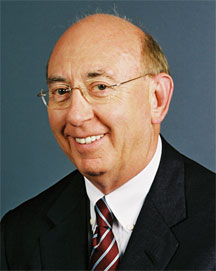
John E. Niederhuber, MD was the 13th director of the National Cancer Institute (NCI), from 2006 until July, 2010, succeeding Andrew von Eschenbach, who went on to become a director at biotechnology firm BioTime. A nationally renowned surgeon and researcher, Dr. Niederhuber has dedicated his four-decade career to the treatment and study of cancer - as a professor, cancer center director, National Cancer Advisory Board chair, external advisor to the NCI, grant reviewer, and laboratory investigator supported by NCI and the National Institutes of Health. He is now Executive Vice President/CEO Inova Translational Medicine Institute and Inova Health System and co-director, Johns Hopkins Clinical Research Network.

Gopalan Shyamala was a biomedical scientist at the Lawrence Berkeley National Laboratory, whose work in isolating and characterizing the progesterone receptor gene stimulated advances in breast biology and oncology. She was the mother of Vice President of the United States Kamala Harris and Maya Harris, a lawyer and political commentator.
Arnold B. Rabson is an American scientist and biomedical researcher. He is the director of the Child Health Institute of New Jersey and the Laura Gallagher Chair of Developmental Biology at Robert Wood Johnson Medical School. Rabson is a Fellow of the American Association for the Advancement of Science.

Michele Kim Evans is an American internist and medical oncologist. She is a senior investigator and Deputy Scientific Director at the National Institute on Aging.
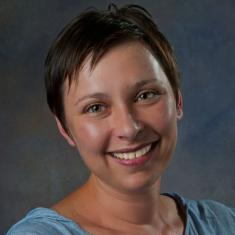
Jadranka Lončarek is a Croatian cell and molecular biologist researching the molecular mechanism of centrosome biogenesis and their function, with particular attention on numerical control of centrosome formation in non-transformed and cancerous human cells.

Stavroula "Voula" Mili is a Greek molecular biologist researching the regulation, functional consequences, and disease associations of localized RNAs. She is a NIH Stadtman Investigator at the National Cancer Institute.
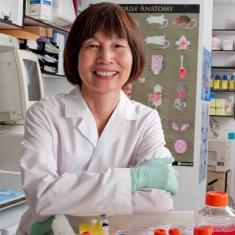
Sheue-yann Cheng is an American molecular geneticist who pioneered the development of mouse models to understand the molecular basis of diseases due to mutations of thyroid hormone receptors. Cheng is a senior investigator at the National Cancer Institute and chief of the gene regulation section.

Barbara K. Felber is an American biologist specialized in human retrovirus pathogenesis and gene regulation. She is a senior investigator in the vaccine branch at the National Cancer Institute.
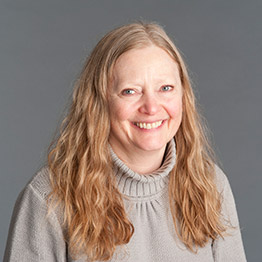
Susan Marie Mackem is an American anatomic pathologist and physician-scientist. She researches vertebrate primary axis formation and the regulation of patterning and differentiation during limb development. She is a senior investigator and head of the regulation of vertebrate morphogenesis section at the National Cancer Institute's Frederick National Laboratory for Cancer Research. She is also an attending pathologist at the National Institutes of Health Clinical Center.
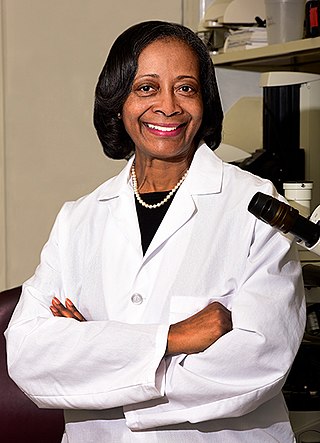
Darlene Dixon is an American veterinary scientist and toxicologic pathologist researching the pathogenesis/carcinogenesis of tumors affecting the reproductive tract of rodents and humans and assessing the role of environmental and endogenous hormonal factors in the growth of these tumors. She is a senior investigator at the National Institute of Environmental Health Sciences.

Jill Reiss Harper is an American molecular biologist and policy advisor serving as the deputy director for science management and executive officer at the National Institute of Allergy and Infectious Diseases.
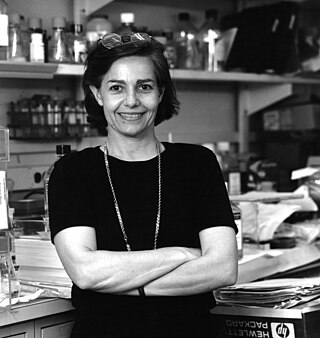
Giovanna Tosato is an Italian–American physician-scientist and cancer researcher investigating the endothelium, angiogenesis, and the hematopoietic stem cell niche. She heads the molecular and cell biology section in the laboratory of cellular oncology at the National Cancer Institute in the United States. Tosato was a division director in the Center for Biologics Evaluation and Research from 1992 to 1999.

Marian Frances Young is an American developmental biologist researching the function of extracellular matrix proteins in skeletal tissues. She is the deputy scientific director of the division of intramural research at the National Institute of Dental and Craniofacial Research.

Dinah Schiffer Singer is an American immunologist specialized in the regulation of transcription in cancer, gene expression, and molecular immunology. She is the deputy director for scientific strategy and development at the National Cancer Institute (NCI). Singer was previously director of the NCI division of cancer biology from 1999 to 2019.

Beverly Anne Mock is an American geneticist who is a deputy director of the National Cancer Institute's Center for Cancer Research.

Neelam K. Giri is an Indian pediatric hematologist/oncologist and physician-scientist who researches bone marrow failure syndromes. She is a staff clinician in the clinical genetics branch at the National Cancer Institute.
















